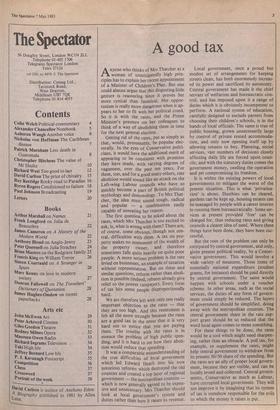A good tax
Anyone who thinks of Mrs Thatcher as a woman of unmitigatedly high prin- ciples has to explain her recent appointment of a Minister of Children's Play. But one could almost argue that this disgusting little gesture is reassuring since it proves her more cynical than fanatical. Her oppor- tunism is really more dangerous when it ap- pears to her to fit with her political creed. So it is with the rates, and the Prime Minister's pressure on her colleagues to think of a way of abolishing them in time for the next general election.
Getting rid of the rates, put as simply as that, would, presumably, be popular elec- torally. In the eyes of Conservative politi- cians, it would have the additional merit of appearing to be consistent with promises they have made, with varying degrees of vagueness, over the past ten years. For them, too, and for a good many others, rate abolition would sound like an attack on the Left-wing Labour councils who have so quickly become a part of British political mythology and demonology. To Mrs That- cher, the idea must sound tough, radical and popular — a combination easily capable of unseating her reason.
The first question to be asked about the rates, which Mrs Thatcher is too excited to ask, is, what is wrong with them? There are, of course, some obvious, though not cen- tral, difficulties with them. A tax on pro- perty makes no assessment of the wealth of the property owner, and therefore sometimes falls quite heavily on quite poor people. A more serious problem is the rate levied on businesses, an example of taxation without representation. But on these and similar questions, reform rather than aboli- tion is possible (indeed, rebates already give relief to the poorer ratepayer). Every form of tax hits some people disproportionally hard.
We are therefore left with only one really important objection to the rates — that they are too high. And this resentment is felt all the more strongly because the rates are a good tax in the sense that it is very hard not to notice that you are paying them. The trouble with the rates is in essence the problem of high public spen- ding, and it is hard to see how their aboli- tion would reduce that spending. It was a comparable misunderstanding of the true difficulties of local government which led Edward Heath into his now notorious reforms which destroyed the old counties and created a top layer of.regional government — the metropolitan counties which is now generally agreed to be expen- sive and unnecessary. Mrs Thatcher should look at local government's system and duties rather than how it raises its revenue.
Local government, once a proud but modest set of arrangements for keeping streets clean, has both enormously increas- ed its power and sacrificed its autonomy. Central government has made it the chief servant of welfarism and bureaucratic con- trol, and has imposed upon it a range of duties which it is obviously incompetent to perform. A national system of education, carefully designed to exclude parents from choosing their children's schools, is in the hands of local officials. The same is true of public housing, grown unnecessarily large by control of private rented accommoda- tion, and only now opening itself up by allowing tenants to buy. Planning, social services, vast numbers of decisions closely affecting daily life are forced upon coun- cils; and with the statutory duties comes the government money, swelling the operation and yet compromising its freedom.
It is within the existing powers of local governments to mitigate the worst of the present situation. This is what 'privatisa- tion' is about. Dustbins can be cleared, gardens can be kept up, housing estates can be managed by people with a career interest in running them bureaucratically. Some ser- vices at present provided 'free' can be charged for, thus reducing rates and giving councils a clearer idea of need. Where these things have been done, they have been suc- cessful.
But the root of the problem can only be extirpated by central government, and only, given present political reality, by a Conser- vative government. This would involve a wide variety of measures. Those items of essentially national expenditure (student grants, for instance) should be paid directly by central government. The same would happen with schools under a voucher scheme. In other areas, such as the social services, the duties of any form of govern- ment could simply be reduced. The layers of government should be simplified, doing away with the metropolitan counties. The central government share in the rate sup- port grant should be so reduced that the word local again comes to mean something.
For these things to be done, the rates would be a tool which might need sharpen- ing, rather than an obstacle. A poll tax, for example, to supplement the rates, might help central government to withdraw from its present 50/50 share of the spending. But the rates are an ally of proper local govern- ment, because they are visible, and can be locally levied and collected. Central govern- ments, Conservative as much as Labour, have corrupted local government. They will not improve it by imagining that its system of tax is somehow responsible for the evils to which the money it raises is put.










































 Previous page
Previous page